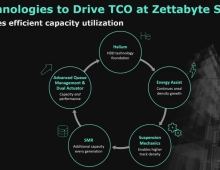
New Consortium Formed To Promote Storage Research
IDEMA (The International Disk Drive Equipment and Materials Association), with 12 founding member companies earlier this week announced the formation of the Advanced Storage Technology Consortium (ASTC).
Open to IDEMA members, ASTC's purpose is the formation of collaborative joint research initiatives among and between storage industry participants, customers, suppliers, universities and laboratories to harmonize in a common direction on the future of next generation storage technologies. Through an expansion of fundamental research, ASTC is expected to shorten the time from innovation to productization while maintaining a competitive marketplace.
Hitachi Global Storage Technologies (Hitachi GST), Marvell, Seagate Technology, Western Digital and Xyratex are among the founding members of the ASTC. Other founding member companies include LSI, Texas Instruments, Fuji Electric, Heraeus, Intevac, KLA-Tencor and Veeco.
"Successfully addressing commercial and consumer storage demand requires continual technology advancements, and ASTC's ambitious agenda underscores the new level of maturity in the storage industry," states Mark Geenen, IDEMA's chairman of its Global Board of Directors. "Significant challenges inherent to future storage technologies have proven too costly, risky, and unmanageable for any single company to pursue alone.
The Advanced Storage Technology Consortium plans will create and direct cooperative research endeavors across the supply chain. These will include (but are not limited to) university level research, common specifications and terminology for new components or manufacturing tools, collaborative working groups on future technologies, and joint development projects," added Geenen.
Utilizing IDEMA's operating structure, members of ASTC said that they would give participants the highest possible level of execution, oversight, cost management, and return on investment. ASTC will also seek financial support from governments and associated laboratories. There are critical advantages to this new approach, according to the consortium:
- Expanded funding of university research: ASTC will expand investment in university research projects, focusing its multi-million dollar budget on critical areas of next-generation storage technologies.
- Direct oversight: industry technical executives and experts will provide leadership on how projects are determined, how projects are scoped, scheduled, executed, and measured; and how funds are administered, including to universities, foundations, or organizations.
- Storage industry roadmap: The lack of a storage technology roadmap has resulted in suboptimal supply chain tuning. ASTC will construct and sustain a storage industry roadmap, which will be the property of ASTC member companies.
Hitachi Global Storage Technologies (Hitachi GST), Marvell, Seagate Technology, Western Digital and Xyratex are among the founding members of the ASTC. Other founding member companies include LSI, Texas Instruments, Fuji Electric, Heraeus, Intevac, KLA-Tencor and Veeco.
"Successfully addressing commercial and consumer storage demand requires continual technology advancements, and ASTC's ambitious agenda underscores the new level of maturity in the storage industry," states Mark Geenen, IDEMA's chairman of its Global Board of Directors. "Significant challenges inherent to future storage technologies have proven too costly, risky, and unmanageable for any single company to pursue alone.
The Advanced Storage Technology Consortium plans will create and direct cooperative research endeavors across the supply chain. These will include (but are not limited to) university level research, common specifications and terminology for new components or manufacturing tools, collaborative working groups on future technologies, and joint development projects," added Geenen.
Utilizing IDEMA's operating structure, members of ASTC said that they would give participants the highest possible level of execution, oversight, cost management, and return on investment. ASTC will also seek financial support from governments and associated laboratories. There are critical advantages to this new approach, according to the consortium:
- Expanded funding of university research: ASTC will expand investment in university research projects, focusing its multi-million dollar budget on critical areas of next-generation storage technologies.
- Direct oversight: industry technical executives and experts will provide leadership on how projects are determined, how projects are scoped, scheduled, executed, and measured; and how funds are administered, including to universities, foundations, or organizations.
- Storage industry roadmap: The lack of a storage technology roadmap has resulted in suboptimal supply chain tuning. ASTC will construct and sustain a storage industry roadmap, which will be the property of ASTC member companies.





















